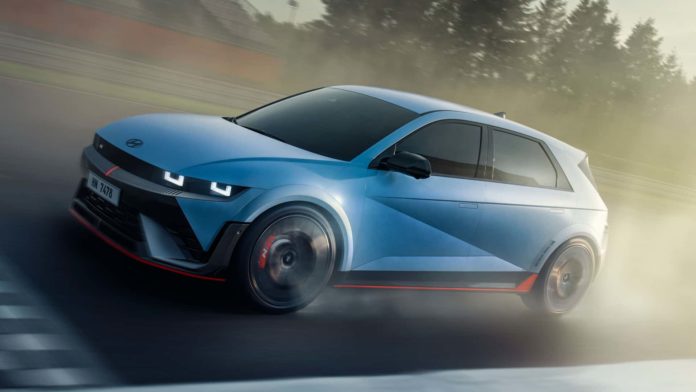Hyundai Motor Company (Hyundai and Genesis brands) reports that its global vehicle sales in July amounted to 334,968 units, which is 1.2 percent more than a year ago. During the first seven months of 2023, the company sold 2,416,508 vehicles (up 9.3 percent year-over-year).
According to the South Korean manufacturer, last month, the combined wholesale shipments (closely related to production) of Hyundai and Genesis plug-in cars, amounted to *23,769 (up 24 percent year-over-year). We estimate that it is around 7.1 percent of the total volume (compared to 5.8 percent a year ago).
*Retail sales in South Korea plus wholesale sales (manufacturer level) outside South Korea, unaudited and on a preliminary basis.
**The Hyundai sales report includes sales numbers from the plants in South Korea, Europe (Kona Electric and Tucson PHEV), Indonesia (Ioniq 5), and plants in China and India (both small numbers), as well as in the United States.
The data indicates that all-electric car volume increased by 24 percent year-over-year to 19,742. Similarly, plug-in hybrid car volume improved 25 percent year-over-year to 4,027.
Hyundai Motor noted that BEV sales (deliveries, as we understand) amounted to more than 19,600 units, slightly behind the wholesale shipments, and that 65 percent of that falls on the Ioniq 5/Ioniq 6 models.
Wholesale shipments by powertrain type:
- BEVs: 19,742 (up 24%) and 5.9% share
Hyundai BEVs: 18,237 (up 28%)
Genesis BEVs: 1,505 (down 14%) - PHEVs: 4,027 (up 25%) and 1.2% share
- Total plug-ins: 23,769 (up 24%) and 7.1% share
- FCVs: 374 (down 38%) and 0.1% share
So far this year, the plug-in electric car wholesale shipments exceeded 197,000, which is about 8.2 percent of the total volume.
Wholesale shipments by powertrain type year-to-date:
- BEVs: 164,801 (up 67%) and 6.8% share
- PHEVs: 32,483 (up 18%) and 1.3% share
- Total plug-ins: 197,284 (up 56%) and 8.2% share
- FCVs: 3,512 (down 37%) and 0.1% share
For reference, in 2022 Hyundai Motor Company sold more than 240,000 plug-in electric cars (up 45 percent year-over-year), including nearly 195,000 all-electric (up 56 percent).
Hyundai brand
The Hyundai brand, which is responsible for the majority of the company’s plug-in car sales, noted a 28 percent year-over-year increase in wholesale shipments, to over 22,000, including over 18,000 BEVs.
Hyundai wholesale shipments by powertrain type:
- BEVs: 18,237 (up 28%)
- PHEVs: 4,027 (up 25%)
- Total plug-ins: 22,264 (up 28%)
- FCVs: 374 (down 38%)

Hyundai wholesale shipments by powertrain type YTD:
- BEVs: 151,843 (up 73%)
- PHEVs: 32,483 (up 18%)
- Total plug-ins: 184,326 (up 60%)
- FCVs: 3,512 (down 37%)
For reference, in 2022, Hyundai’s plug-in electric car wholesale shipments amounted to over 221,000, including over 175,000 all-electric cars.

Close to two-thirds of the entire Hyundai BEV volume are two models – Ioniq 5 and Ioniq 6, both based on the E-GMP platform.
An interesting thing in July was that the all-new, sporty Hyundai Ioniq 5 N appeared in the sales stats for the very first time. Hyundai says that it exported 10 units from South Korea (there were no local sales yet).
Top models (wholesale shipments) last month (and YTD):
- Hyundai Ioniq 5 – 9,189 (68,982 YTD)
- Hyundai Kona Electric – 4,485 (43,593 YTD)
- Hyundai Ioniq 6 – 4,553 (39,258 YTD)
- Hyundai Tucson PHEV – 2,646 (23,631 YTD)
- Hyundai Santa Fe PHEV – 1,381 (8,852 YTD)

The hydrogen fuel cell model — Hyundai NEXO — noted 374 units last month (and 3,512 YTD).
Genesis brand
In the case of Genesis, the brand’s wholesale shipments of all-electric cars (GV60, Electrified GV70, and Electrified G80) amounted to 1,505 (down 14 percent year-over-year). That’s the third consecutive year-over-year decrease. The year-to-date volume is 12,958 (up 21 percent year-over-year).


